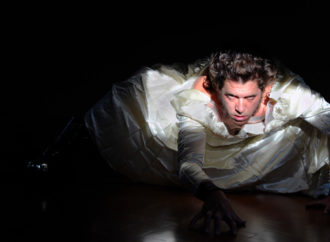Alas, poor pretty creatures, have neither breath nor brains to drink of knowledge deepl

CHAPTER III.
Whether Women are equal to Men in their intellectual Capacity, or not.
If the business of the mind were nothing more than to contrive a dress; to invent a new fashion; to set off a bad face; to heighten the charms of a good one; to understand the economy of a tea-table; to manage an intrigue; to conduct a game at quadrille, and to lay out new plans of pleasure, pride and luxury; then women must be owned to have a capacity not only equal but even superior to us. But as the understanding of man has infinitely higher objects to employ its speculations on, objects beyond the very aim of the ablest women; their intellectual faculties are so evidently inferior to his, that I should think it an impertinence in me to take up any time to prove it. Need we look any farther than their soft, simpering, silly faces to fathom the perceptible depth of their understandings? View the whole sex round:
Eternal Smiles their Emptiness betray
As shallow Streams run dimpling all the way.
Pope.
A thoughtless stare, a wild vivacity, a sleepy pertness, giddy gravity, or some such other sense-defying look betrays, in all, the narrow space between the surface and centre of their mimic wit. How well the masterly Limner knew them, who snatched from them the graces he so skilfully bestowed on Sporus, that copy of themselves, inspired too by them as they by Satan! As nothing can show the finished mastery of that excellent piece in the fairer light than giving back to its pretty originals whatever is borrowed from them, it cannot be amiss to do it, considering it requires but little alteration: a presumption, I dare say, that ingenious author will excuse.
Whether in florid impotence they speak,
And, as the prompter breathes, the puppets squeak,
Or, Eves true spawn, and tools of the ancient toad,
Half froth, half venom, spit themselves abroad,
In puns, or politics, or tales, or lies,
Or spite, or smut, or rhymes, or blasphemies.
Their wit all see-saw, between that and this,
Now high, now low, now forward, now remiss,
And each herself one dull antithesis.
Amphibious things! That acting either part,
The trifling head, or the corrupted heart,
Bullies at cards, and flirts when at the board,
Now jilt like Dames, now swear like any Lord.
Their tempter thus the Rabbins have expressed,
A cherubs face, a reptile all the rest.
Beauty that shocks you, parts that none will trust,
Wit that must creep, and pride that licks the dust.
In Fact, what is all their discourse but froth? What inspires it but venom?
And in what does their Sprightliness appear, but in empty puns, conundrums, rebukes, trifling politics or mischievous lies? They who shine most among them, are such as have nothing to entertain you with but scandal, indecency, hypocrisy, or impiety. What is their wit but a mere see-saw from one inconsistency to another? Their conversation is ever screwed up to bombast, when it should be familiar; or sunk into meanness, when the subject they presume to meddle with is sublime. Where they should be silent, they are as forward to prate, as they are remiss in speaking on proper occasions. In short their talk, like their persons, is one continued, insipid antithesis. Amphibious things indeed! Whose impotent eagerness to be like man serves only to show that they are but mere mechanic rote-repeaters of his words, and unsuccessful mimics of his sense. How unlike are they at their tea-tables to the sensible things they would be thought; and at the card-table how short of the spirit of the noble creatures they would be! There is nothing of a piece in them but the corruption of their hearts and the low cunning of their heads. If ever they succeed in aping us, it is in what is a disgrace to understanding. Whenever they attempt it, they can swear as well as the greatest libertine among us, though still without excelling the parrot in anything but the guilt. Thus ever actuated by perversity, they are never truly like us; and are never themselves, but when they jilt us: though in that, thanks to their native talents, they seldom fail to be true women. How ill-bestowed then on these fantastic things is the beauty we admire in them! And if it was bestowed on them by nature to decoy us into a commerce with them, for the benefit of propogation; must it not still shock our reason when we consider it accompanied only with parts which we can reap no benefit from, nor place any confidence in? And what assistance can we hope from their false wit, as groveling as the pride it inspires them with?
But Sophia it seems would fain make a handle of the beauty of her sex to impose upon us an opinion of their sense; and because “the organs of the body are more delicate in them, therefore they must be fitter to answer the ends they were made for.” True in one sense, the organs of women were designed for finical amusements, and therefore were made more delicate than ours, in that sense of the word. But if by delicate she means more perfectly or exactly formed; I must insist that experience in the use proves ours to be more solidly and exactly formed than those of the women. And fit they should be so, considering the more noble uses they were designed for, and are employed in. But granting for a minute that the organs of sense are as perfect in women as in men, and yet more delicate; what can Sophia infer but that they are more liable to be thrown into disorder, and therefore the less to be depended upon? As the mechanism of a watch, the more minute, gim, and delicate it is, the more is it subject to inconstancy. A consideration which I willingly mention to apologize, as much as the nature of the thing will bear, for that otherwise unaccountable inconstancy in which alone the fair sex are ever constant.
Not that I entirely come into my soft antagonist’s opinion,
That the organs in women are any more adapted to the natural functions of the mind than in men: perhaps they are less so. For the external sleekness of their pretty forms is no proof of the internal perfection of their organization. And to imagine a woman must have sense because she is handsome, would be as absurd as to think that a house must needs be finely furnished within, because the outside is beautiful: an error to be excused in none but a woman.
What angel can imagination paint more beautiful than Pavonia! What reptile more insensate! To reason by Sophia’s rule, our eyes would cheat us into the belief that she surpasses all the sages time has yet produced. And yet hear her but speak, you’ll almost doubt if Heaven had any hand making a thing at once so fair and foolish, though so like a man. Never guilty of design, she never looks it. Her smiles and frowns, alike effects of accident, want power to please or displease. Her words mere liquid sounds of half-articulated nonsense, gush from her pretty coral-spouted mouth with such unmeaning energy, or drip with such deliberate drawl that even ridicule is robbed of all its zest. Frequent in blunders, she excites no laugh in others; but often laughs herself, when she should be most serious. Her misbehaviour moves no anger, and her favors lay no obligations but upon such as are little wiser than herself. Every motion, every air betrays the fool, whom they who have sense can scarce stoop to pity, and they who have none scarce condescend to envy. In a word, gazed at by all, she is admired and conversed with by none but idiots and women. Amidst whom while she alternately reigns the idol of flattery, and slavishly sinks the dupe of deceit, she is still looked down upon by all men of sense, with the same contempt as the comely peacock: though she be worthy of greater scorn in this, that the more beauteous bird bears all his blemish in his feet, while her disgrace is feated in her head; his deformity abates his pride, while hers but serves to make her more incorrigibly vain. Must it not be owned then, that beauty is a convincing proof of sense in its fair possessors? But Sophia perhaps will answer that one black feather makes no crow. Let us then see, how much wiser the rest of her sex are than pretty, simple Pavonia?
It is a common rule, and liable to very few mistakes, to guess at people’s Genius by their company.
To know then the capacity of the fair sex, let us but survey their favourite companions. Eye them, and you will find them the very dregs of our sex; fops whose whole merit is made up of dress and drivel, show and emptiness; mere Jack-daws and parrots; nay, rather gawdy, screech-owls made fine with plundered plumes. Laced-waistcoats, smart toupees, light heels, and lighter heads, are all they have to recommend them to the Ladies. Yet they are sure to please, because eminently qualified to discuss the weightiest arguments on country-dances, to decide the fate of fashions, square the round of a woman’s petticoat, and take the latitude of a nightcap from the equinox of her noddle, or the longitude of two lappets by the meridian of her whims. Not that I the least blame the lovely female triflers who are pleased with them. ‘Tis but natural for birds of a feather to associate; and since likeness ever begets liking, why should they not be fondest of those men whose follies are nearest their own? But then I would not have them boast of an equality of sense with those men, whose superior understanding is all they have to find fault with.
It will be to little purpose for Sophia to quote me the illustrious names of many of the greatest wits of all ages who have admired, and been admired by, the women. Has not the success they have met with been more owing to their being men, than to their having sense? Anacreon, the polite, the witty Anacreon, with all his fine parts reaped nothing from his pursuit of those unsettled things but the contempt of his agedness. And Theocritus himself makes no secret of the little encouragement he met with. The lesser poets indeed, as well as Ovid and Horace, received some marks of their favour; but what were these mighty favours if you will believe their own boasts, but the sharing the lewdness of their mistresses with half the town. If I leave the classics it will be an endless toil to enumerate the many instances that that thought-abhoring sex have, at all times and on all occasions, furnished, of the preference they give to fools before men of parts. But where is the necessity of recurring to other times and countries for what our own can produce? Of all our fine Ladies industrious in adorning the brows of their husbands, where is there one who does it with a man of true wit? Of all our pretty widows ruined by second adventures, where is there one who does it with a man of any merit? Search but the registers of the fleet, and you shall find numbers of our fairest, brightest heiresses charmed away from their guardians by lacqueys, valet-de-chambres, and powdered, empty coxcombs; but scarce one single match with a really rational creature. In short, who are the persons who can boast of the favours of all our finest women, but wretches too low for the jest of our sex, and too much like theirs to differ from them in any thing but one single circumstance. Let the amorous billets they scribble be produced; and for every one that is directed to a man of sense, I’ll allow them a grain of understanding more than they are entitled to.
But surely they are not all void of understanding.
No; but to fathom the depth of their understandings, remark only the objects which employ them. Frequent their drawing-rooms, and listen to their conversation: what is it filled up with but annoying repetitions of stale impertinencies to every new visitor? One part of the week, the day is wasted in visiting and contriving visits to persons they hope not to find at home, and the night in receiving visits from persons they would rather be almost blind than have the sight of: The other part, their mornings, are laid out in interrupting some tradesmen whom they know to be busy, and lulling their own time as well as murdering his in rummaging his shop for goods they neither want nor purpose to buy; and their evenings are eked out with tea, slander, operas, and quadrille, when the intrigues on their hands are not interfered with. In a word upon examining them thoroughly, it must be owned that not all the bloom on their cheeks, nor the washes they owe it to, can make any tolerable amends, in the esteem of a wise man, for the folly, vanity, affectation, malice, deceit and impertinence which appear in all they say, and inspire all they do.
And yet it must be granted, there are women, who employ their understandings on higher objects; who can try to reason; and almost succeed in it. Nay there are some can write, can even spell; and, what is more, can turn a sophistry to look not altogether unlike an argument. And therefore it would be quite ungenerous not to allow a brilliancy of wit (however false) in some of them. Especially since my pretty smooth antagonist has given so late proof of it in herself. And yet even she
Had she been blessed with only half her sense,
None could admire too much her excellence.
But since she can make error shine so bright,
She thinks it vulgar to defend the right.
With understanding she is quite o’er-run;
And by too great accomplishments undone.
With skill she vibrates her unwearied tongue,
For ever most divinely in the Wrong
Young.
So dangerous is a little understanding to that tender sex! How happy is it for them, that learning but seldom molests them! What strange distraction would it not create in their poor tender heads! Is not Sophia’s self a living demonstration that to them
A little learning is a dangerous thing?
And they, alas, poor pretty creatures, have neither breath nor brains to drink of knowledge deeply. Good sense and tea they are forced to sip alike; their heads and stomachs of equal delicacy can best digest the shallowest draughts of all but mum and mischief. Let thus much then suffice to show Sophia how little room she has to complain of want of learning in her sex; and how much less, for any parallel between her sex and ours in point of understanding; when her own essay plainly proves how short the brightest of them fall of man’s superior wisdom. Is there nothing less will serve the women’s turn than having an equal share with us in Government and public offices? Let us then weigh their best pretentions to so extraordinary a privilege.
Previous / “Man Superior to Woman” / Next
Part of the collection of – A Wrinkle In Time
Backed Up and Credited by – no-maam.blogspot.com
































Leave a Comment
Your email address will not be published. Required fields are marked with *